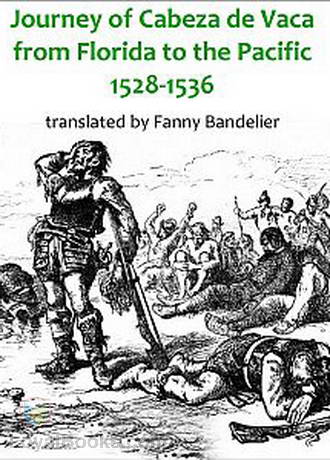
Few stories of shipwreck and survival can equal that of the 16th century Spaniard Alvar Núñez Cabeza de Vaca who, cast ashore near present day (USA) Tampa Bay, Florida, in 1528, survived eight years of hand-to-mouth existence among the Indians of the South and Southwest, and who walked on foot across the plains to the Pacific Coast, arriving in Mexico in 1536. In 1542 he published an account of his adventures, and the present reading is based on Fanny Bandelier’s English translation of that text.
Cabeza de Vaca, along with three other survivors, two Spaniards and a North African (Estévanico, a black slave) endured incredible hardships. Cabeza da Vaca was, himself, at first enslaved by the Indians, forced to dig roots with his bare hands for food. However, he soon showed powers of adaptation that allowed him to survive. He became a trader, bartering “seashells and cockles” from the coast for hides, red ochre, flint, and deer hair tassels from the inland tribes. “Trade suited me well,” he writes, “because it gave me liberty to go where I pleased.” The Indians “rejoiced greatly when seeing me and I would bring them what they needed, and those who did not know me would desire and endeavor to meet me for sake of my fame.” Cabeza de Vaca’s “fame” soon grew to include a reputation as a healer. In return for his “cures,” the Indians gave him “all that they had,” which included food, often in perilously short supply.
The success of the survivors’ final overland treck in search of Spanish settlement reflected their comprehension of Indian customs and values. They were passed along from one tribe to another, accompanied by an entourage of friendly natives. At each stop, Cabeza de Vaca saw to it that the food and presents he received were distributed to his followers by their chiefs, thus ensuring their loyalty.
After eight years among the Indians, Cabeza de Vaca had a hard time adjusting to “civilization.” He writes that the Spanish governor in Mexico “received us very well, giving us what he had, for us to dress in; but for many days I could bear no clothing, nor could we sleep except on the bare floor.” His first person narrative is an exciting tale of survival “against the odds.”
(Introduction by Sue Anderson)

Other Audiobook
Audiobook: Gloves Past and Present
From the preface: “For thirty years I have devoted myself to the practical problems of
Audiobook: Mary Ware’s Promised Land
In this latest and most delightful book Mary’s desire to visit “The Locusts,” the old
Audiobook: Sree Krishna, The Lord of Love
I beg to present this my humble work to the English reader. It is the
Audiobook: The Children’s Book of Christmas Stories
Many librarians have felt the need and expressed the desire for a select collection of
Audiobook: Desirable Alien at Home in Germany
A travel journal of a year the author spent in Germany. With a preface and
Audiobook: Jolly Corner
“The Jolly Corner,” published in 1908, is considered by many to be a ghost story
Audiobook: Golden Fleece and the Heroes Who Lived Before Achilles
This is Irish folklorist Padraic Colum’s masterful retelling of many Greek myths, focusing on Jason
Audiobook: Cuentos de terror latinoamericanos
El cuento latinoamericano a menudo es relegado fuera del ámbito del relato de terror, y
Audiobook: Loafing Along Death Valley Trails; A Personal Narrative Of People And Places
William Caruthers was a retired newspaperman who spent 25 years listening to stories told by
Audiobook: The Interesting Narrative of the Life of Olaudah Equiano, Or Gustavus Vassa, The African
The Interesting Narrative of the Life of Olaudah Equiano, written in 1789, is the autobiography
Audiobook: She Stoops to Conquer
In She Stoops to Conquer, or The Mistakes of a Night, a young lady pretends
Audiobook: Clandestine Marriage
A secret liaison and wedding. What will happen when they find out? – Summary by